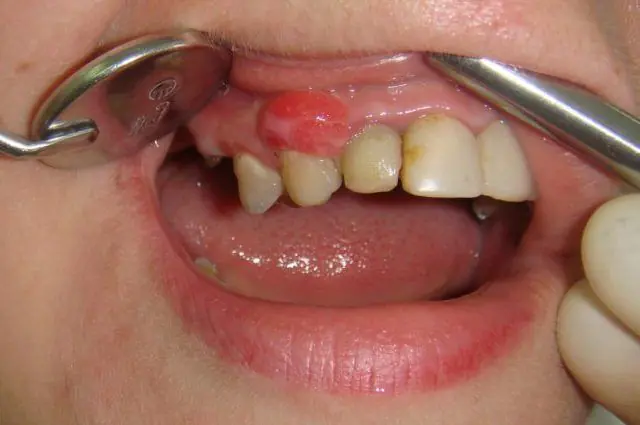
- Description of papillomas in the mouth
- Which doctor should I contact for papillomas in the mouth?
- Otolaryngologist
- Dentist
- Virologist
- Oncologist
- Immunologist
- Dermatologist
Papilloma in the mouth is a small tumor resulting from the active activity of the virus of the same name. A fairly wide range of specialists are involved in solving this problem, among whom we can particularly highlight otolaryngologists, dentists, oncologists, dermatologists, virologists, and immunologists. If possible, it is better to visit each of these doctors. First, you should make an appointment with a therapist, and he will tell you which doctor to contact for papilloma in the mouth.
Description of papillomas in the mouth
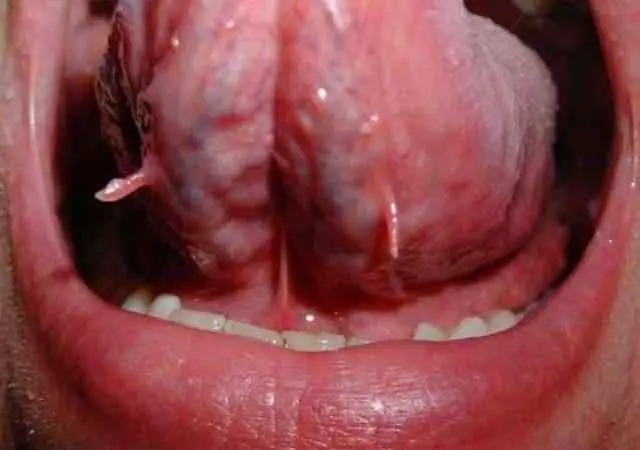
In the photo there is papilloma in the mouth
Papillomas in the mouth include all those formations that are localized within this zone: on the inner wall of the cheeks, on the lingual and palatine tonsils, on the mucous membrane of the throat, gums, and lip. Outwardly, they look the same as growths on the skin.
Their peculiarity is that such growths usually cause severe discomfort when eating, and sometimes when talking.
A person with oral papilloma may experience the following symptoms:
- Hoarseness. This mainly happens with complete or partial damage to the vocal cords, when the growth spreads from the oral cavity deeper, directly into the throat. This sign appears only in advanced cases, when the size of the formation is more than 1-2 cm.
- Sensation of a foreign body in the mouth. This feeling occurs when the papilloma is located in the tongue area, on the lingual tonsil and other areas that receive physical impact when eating.
- Pain. It appears extremely rarely, and this only happens when the formation is large. The reason for this is pressure on the mucous membrane and damage to the growth, for example, by teeth.
- Bleeding. This symptom occurs when the integrity of the papilloma in the mouth is damaged. This can happen for several reasons: as a result of eating too hot food or due to the use of medications with an aggressive composition for rinsing.
The appearance of papilloma in the mouth is associated with the activity of HPV types 13 and 32. The danger of these formations lies in the high probability of their transformation from benign to malignant. Also, subsequent growth of the lump can cause problems with the functioning of the speech apparatus and lead to disruption of normal breathing.
- Read also what warts in the mouth look like
Which doctor should I contact for papillomas in the mouth?
Any diseases and defects associated with the oral cavity are primarily dealt with by an otolaryngologist. In children, this function can be performed by an ordinary pediatrician, but this is justified only if the problem has not progressed. He first examines the mucous membranes, tongue, tonsils and other organs located in this area.
Visiting an otolaryngologist for oral papilloma
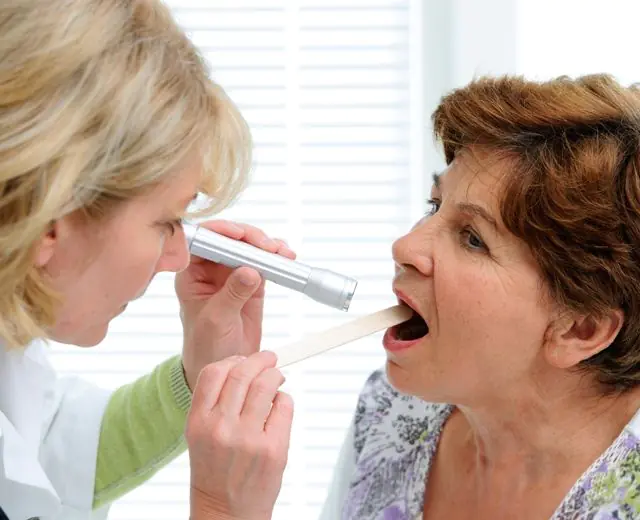
When trying to understand which doctor to go to with papilloma in the mouth, it must be said that the ENT examines a person for growth, including on the vocal cords and lingual tonsil, in the nasal cavity, etc. If it is not very deep, then a visual inspection using a special mirror is usually sufficient. Otherwise, a more thorough diagnosis is required. Here can be assigned:
- Laryngoscopy. It can be indirect, performed in an outpatient setting, and direct (deep), requiring general anesthesia and placing the person in a hospital. This diagnostic technique is relevant only if there is a suspicion of a growth at the root of the tongue, on the vocal cords and in other hard-to-reach locations. This procedure for papilloma in the mouth can be carried out by the ENT specialist himself.
- Videoendoscopy. This technique involves inserting into the oral cavity, sometimes through the nose, a thin tube with a camera attached to the end to study the condition of the mucous membrane. This is an unpleasant and painful procedure, so it is prescribed only when indicated and if a biopsy is necessary. It is performed under local anesthesia.
- Radiography. As the name implies, this is nothing more than the usual “photography” of suspicious areas using special rays. If small doses of radiation are used, this procedure does not pose a health hazard, but it is still often not recommended. This method should be excluded during pregnancy, as it can negatively affect its course. A doctor with an ENT specialization does not perform this procedure for oral papilloma on his own; he refers the patient to other specialists.
If a growth is detected and malignancy is suspected, the ENT specialist must take a sample and send it for histological examination to exclude oncology.
Visiting the dentist for oral papilloma
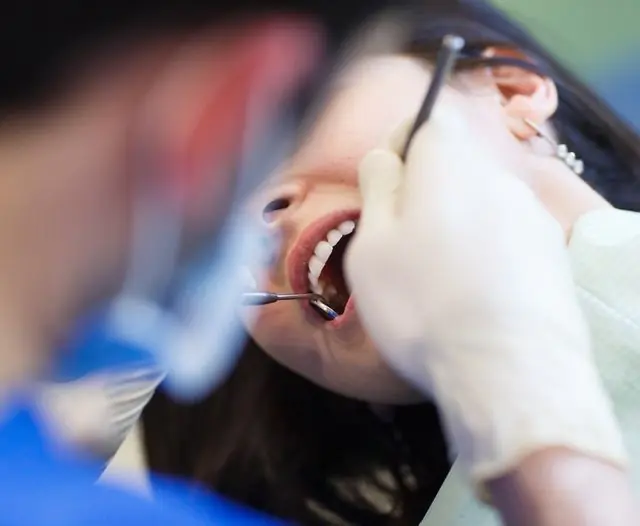
Along with otolaryngology, this is another branch of medicine that studies diseases of the oral cavity. In other countries, especially in the United States, this specialist is also called a dentist or dentist. These doctors are not directly related to papillomas, but their consultation is relevant, for example, when growths are located near molars. This can provoke discomfort and inflammation of the gums, which is definitely within the competence of such a doctor.
If you are not yet sure which doctor to go to with papilloma in the mouth, but are going to the dentist in the near future, be sure to tell him about your problem. He, just like an ENT specialist, will conduct a visual examination of the mucous membranes for the purpose of diagnosis, but without examining the entire larynx in detail. Its task is to evaluate the surface areas and determine whether the growth is the result of any dental pathologies. For this purpose, a special mirror and x-ray can be used, and a 3D study can be carried out. The latter is the most informative and accurate in indications.
Consultation with a virologist for oral papilloma

As is clear from the specialization, the tasks of this doctor include the study of various viruses, as well as the diagnosis, treatment and prevention of diseases that they cause. Since papillomas arise precisely as a result of HPV activity, the search for effective methods to combat them lies partly in the area of responsibility of a doctor with this profile.
If you want to find out which doctor treats papillomas in the mouth, you must not forget that it is the same virologist who helps determine which strain of the virus provoked its growth. He can participate in the analysis of blood and excrement to identify the causative agent of the disease. Most often, it is necessary to take referrals from him for such research.
The role of the virologist is enormous because without suppressing the activity of the papilloma virus, it is impossible to talk about the possibility of removing the formation caused by its activity. He can suggest suitable preventative measures, recommend good antiviral agents and drugs for treatment.
Important! If you have papilloma in the mouth, you should consult this doctor regardless of the location of the growth, whether it is located on the skin or mucous surfaces.- Read also: what is human papillomavirus and how to treat it
Consultation with an oncologist for oral papilloma
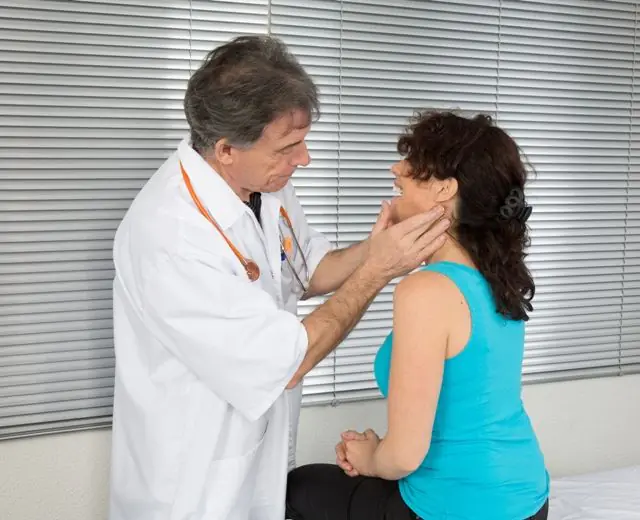
Such consultation is justified if there is suspicion of a malignant process. Usually, an oncologist is contacted if there is a sudden change in the shape, color, structure of the formation, if it sharply increases in size, if there is discomfort, redness and itching, or if there is bleeding.
Consultation with this doctor becomes especially important for oral papilloma caused by oncogenic types of the virus. Scientists count more than 18 such strains, some of them are less dangerous, while others pose a serious threat to health, including the oral cavity.
The oncologist’s task is, together with a virologist, to determine how serious the type of HPV that has affected a person is, and to carefully examine the formation for integrity and pathological changes. If necessary, he must select a sample and submit it for examination to exclude malignancy.
Important! An ENT-oncologist plays a huge role in the diagnosis and treatment of papillomas in the mouth. Such specialists are rare, and to find them, you need to contact either special hospitals or go to a radiological center.Consultation with an immunologist for oral papilloma

This specialist works with people whose papilloma is the result of problems with the immune system. A visit to him when a growth forms in the mouth is mandatory, since such failures occur in almost every person.
At the appointment, the doctor collects the patient’s medical history and refers him to the necessary tests to identify the causes of the growth. To determine the culprit for the growth of papilloma in the mouth, the immunologist gives a referral for a general and clinical blood test, sugar testing, rheumatoid tests and other studies. It is he who has the right to prescribe effective stimulants of the immune system and control the progress of treatment.
The problem is that many hospitals simply do not have an immunologist on staff. Therefore, his responsibilities are often transferred to the shoulders of the same virologist, infectious disease specialist or ordinary therapist.
- Read also about proper nutrition for the prevention of human papillomavirus infection
Examination by a dermatologist for oral papilloma
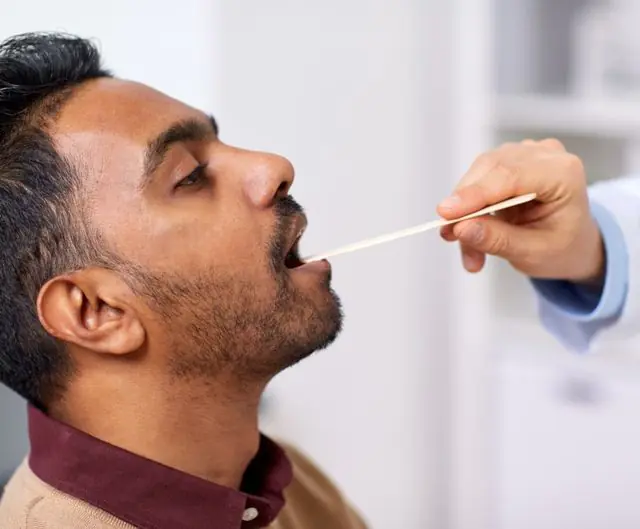
When looking for an answer to the question of which doctor to contact for oral papilloma, do not forget that a dermatologist deals only with the diagnosis and treatment of skin-related diseases. But in recent years, his tasks have also included examining patients with complaints of growths on the mucous membranes, including in the oral cavity.
During the consultation, the doctor must examine the formation, visually assess its condition and, if necessary, scrape it. In case of papilloma in the mouth, the dermatologist is obliged to exclude violation of the integrity of the growth, its bleeding, inflammation and redness. He, like other specialists, can give directions for tests necessary to clarify the causes of the problem.
Finding such a doctor is not easy, since at the end of residency, graduates choose more universal specialties, for example, dermatologist-oncologist. It will be even better to contact him, this will reduce the time for diagnosis.
In severe cases, when during long-term treatment of papilloma in the mouth the doctor is unable to eliminate it using conservative methods, a visit to a physiotherapist may be recommended. This is also a physician who removes growths using liquid nitrogen, electric current, a laser machine, a radio knife and some other methods suitable for use in the oral cavity.Which doctor should you contact for papillomas in the mouth - watch the video:
To summarize, it must be said that the easiest way would be to first contact a general practitioner or family doctor. He will be able to tell you exactly which doctor removes papillomas in the mouth and what examinations you need to undergo before this. Otherwise, there is a possibility of spending a lot of money, time and nerves, postponing the solution of the problem for a long time.
- Related article: What causes papillomas: main causes



